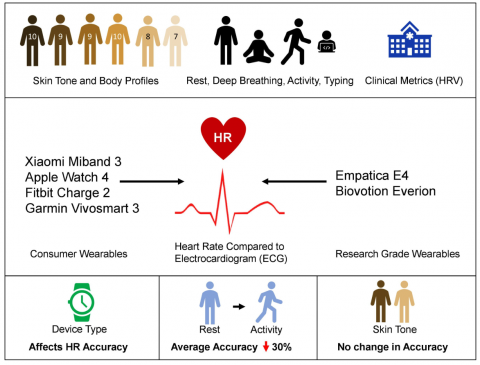February 19, 2020

Wearable technology has the potential to transform healthcare and research through accessible, continuous, and longitudinal health monitoring. The coming ubiquity of wearable technology will particularly provide a unique opportunity to revolutionize health care in communities with traditionally limited healthcare access. However, the accuracy of wearable technologies has been a hotly debated topic both in research and in popular culture. As wearable technologies are increasingly being used for clinical research and healthcare, it is critical to understand their accuracy and determine how measurement errors may affect research conclusions and impact healthcare decision-making.
In this study, we tested optical heart rate sensors on six of the most popular devices on the market for both consumers (Apple Watch, Fitbit, Garmin, XiaoMi Miband) and for research (Empatica E4, Biovotion Everion) against the clinical reference standard for monitoring heart rate, the electrocardiogram (ECG). We tested the devices on a population that was roughly evenly distributed across all skin tones according to the Fitzpatrick skin tone scale.
Read more:
"Can Wearables Keep Up With Us?, Nature Digital Medicine, click here.
"Heart Rate Measurements of Wearable Monitors Vary by Activity, Not Skin Color", Duke Biomedical Engineering Press, click here.
"How Accurate are Fitbits and Smart Watches?", Spectrum News, click here.
Citation:
“Investigating Sources of Inaccuracy in Wearable Optical Heart Rate Sensors,” Brinnae Bent, Benjamin A. Goldstein, Warren A. Kibbe, Jessilyn Dunn. npj Digital Medicine, 2020. DOI 10.1038/s41746-020-0226-6